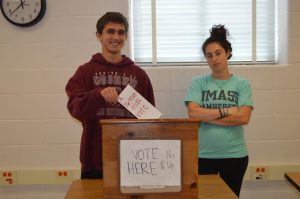Pro: Voting Age
May 30, 2019
Following last year’s shooting at Marjory Stoneman Douglas High School, youth activism surged throughout the country. And while high school students struggle to be heard, they are deprived of the most fundamental instrument needed to create change: the right to vote.
The United States should lower the voting age to 16 because it will make federal, state and local government more ideologically representative of the country, giving young people a say in issues that affect them most.
Historically, expanding voting rights has created an increasingly diverse legislature. When the 15th Amendment was passed, granting the right to vote to African Americans, Congress became accountable to that population and the problems that affected them. Better representation and further accountability also followed in the footsteps of women and 18 year olds gaining the right to vote.
Sixteen year olds can pay taxes, drive cars and at times be prosecuted as adults in the criminal justice system. Given how ineffective Congress has been at representing the opinions of America’s youth, students should be able to choose the leaders who govern these issues.
In the U.S., the average age of the population is 38 years old according to Statista. However, the average age of Congress is 57.8 years old according to Senate.gov. This creates unbalance in political ideologies as Generation Z (born 1997-present) holds more liberal views than the baby boomers who make up the bulk of Congress, according to January polling by the Pew Research Center.
Congress’s voting reflects this demographic discrepancy. Issues that Generation Z believes are most important such as climate change, public school quality and increasing ethnic diversity are liberal leaning and predominantly affect younger Americans. These issues have gone unaddressed by the older, more conservative Congress. Lowering the voting age to 16 would undoubtedly help remedy this discrepancy and allow Generation Z to have their voices heard.
Opponents of the suggested amendments to HR1 in Congress, which proposed lowering the voting age, point to the fact that the youngest section of eligible voters has the lowest voter turnout according to an analysis of 2016 voting data by National Public Radio. This is indicative of apathy and political disengagement among youth.
Younger voting could, however, reverse that by instilling good voting habits which transfer into teen’s adult years. After 16- year olds in Takoma Park were extended the right to vote, voter turnout among registered 16 and 17 year olds was more than four times the turnout among registered 18- year olds in the same election, according to the National Association of Student Personnel Administrators.
Congress should expand voting rights to 16 year olds. It is essential to holding leaders accountable to the issues of the future and will lead to lawmakers who are more representative of their constituents.




